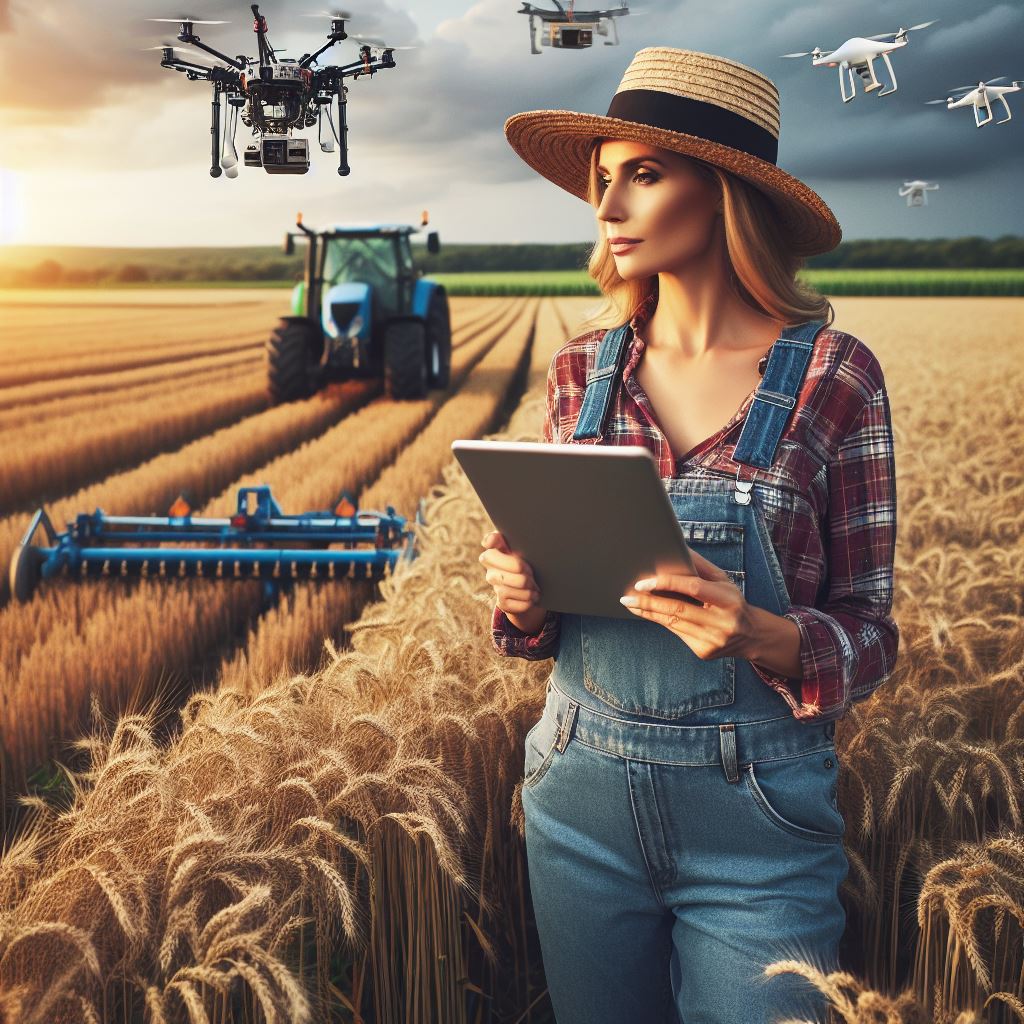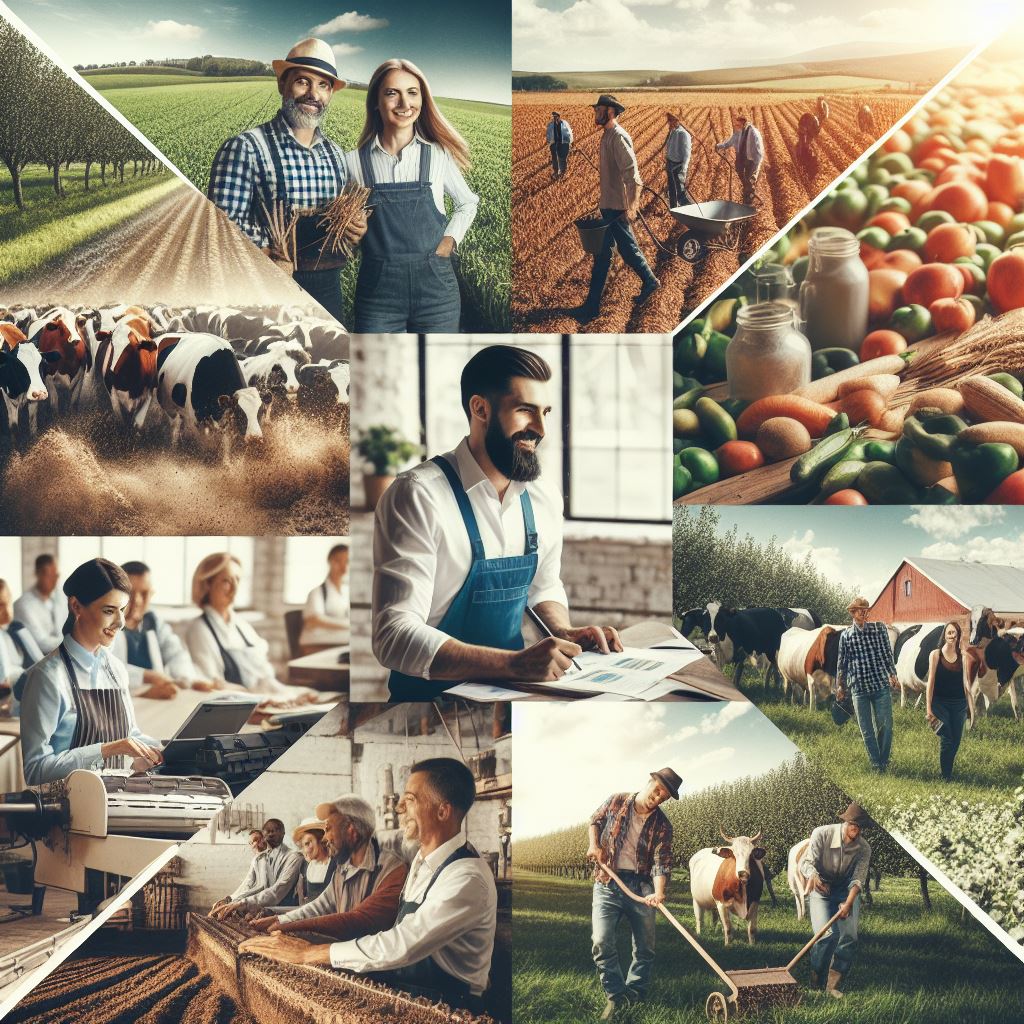Introduction
What AI is and its relevance in different industries, including farming
AI, a transformative force in various industries, including farming, simulates human intelligence, analyzes data, and enhances profits in agri-business.
Harness AI for optimized processes, increased productivity, and reduced costs in AI in Farming Agri Business Profits.
Potential benefits of implementing AI in agriculture
One of the benefits of using AI in agriculture is improved crop yield predictions.
AI algorithms can analyze historical data, weather patterns, soil conditions, and crop characteristics to accurately predict yields.
This information enables farmers to make data-driven decisions regarding planting, harvesting, and resource allocation.
AI also facilitates precision farming, which involves the use of sensors, drones, and AI-powered machinery to monitor crops and make targeted interventions.
By applying AI techniques, farmers can detect diseases, pests, or nutrient deficiencies at an early stage, allowing for timely interventions and reducing crop loss.
Furthermore, AI can optimize the use of resources, such as water and fertilizers.
By analyzing data from sensors and weather stations, AI algorithms can determine the precise amount of water and nutrients required by each plant, ensuring efficient resource allocation and minimizing waste.
The implementation of AI in agriculture also promotes sustainable farming practices.
By optimizing resource usage and reducing chemical inputs, AI helps farmers reduce their environmental footprint and protect natural resources.
In addition, AI offers immense potential for the farming industry.
By leveraging AI technologies, farmers can increase productivity, optimize resource usage, and enhance decision-making, ultimately boosting agri-business profits.
Read: Maximizing Profit: Selling Your Farm Land Wisely
How AI is Transforming Farming Practices
Exploration of AI’s Role in Optimizing Farming Tasks
AI technology has revolutionized the agricultural sector by streamlining farming practices and enhancing agri-business profits.
Transform Your Agribusiness
Unlock your farm's potential with expert advice tailored to your needs. Get actionable steps that drive real results.
Get StartedLet’s delve deeper into how AI is being used to optimize various farming tasks.
Crop Monitoring
AI-powered systems equipped with computer vision are employed to monitor crops and identify signs of diseases, nutrient deficiencies, or pest infestations accurately.
Irrigation
By analyzing real-time data collected from soil moisture sensors, weather predictions, and plant health indicators, AI algorithms aid in efficient irrigation management.
Pest Control
AI-based models analyze data on pest behavior, weather conditions, and farming practices to determine optimal pest control strategies, minimizing chemical usage.
The Role of AI-powered Drones and Robots
The integration of AI-powered drones and robots has revolutionized farming operations, enabling farmers to accomplish tasks more efficiently and precisely.
Drone Applications
- Monitoring Crop Health: Drones equipped with AI-enabled cameras capture high-resolution images, helping detect early signs of crop diseases or nutrient deficiencies.
- Seed Planting: AI-powered drones can accurately sow seeds at optimal spacing, reducing time and labor required for manual planting.
- Spraying Pesticides: Drones with AI algorithms analyze crop data to precisely spray pesticides, eliminating wastage and minimizing environmental impact.
Robot Utilization
- Weeding: AI-powered robots can identify and remove weeds effectively, reducing the need for manual labor and herbicides.
- Harvesting: Robots equipped with computer vision accurately identify ripened fruits and vegetables, significantly enhancing harvesting efficiency.
- Milking: AI-based robotic systems recognize and automatically milk cows, ensuring efficient and stress-free operations.
AI Applications in Precision Agriculture
Precision agriculture involves utilizing AI to optimize farming processes by analyzing vast amounts of data and making informed decisions.
Yield Prediction
AI algorithms analyze historical data, weather patterns, and satellite imagery to predict crop yields accurately.
Farmers can make proactive decisions regarding planting, harvesting, and marketing.
Soil Analysis
AI analyzes sensor-collected soil data, determining nutrient levels, moisture, and soil health indicators through machine learning.
This enables farmers to tailor fertilization and irrigation plans.
Resource Optimization
AI models analyze farm inputs—water, fertilizers, and energy data—to optimize resource allocation, cutting costs, and promoting environmental benefits by reducing waste.
Summary
AI has become a game-changer in the agriculture industry, enhancing farming practices and boosting agri-business profits.
Leveraging AI in crop monitoring, irrigation, pest control, drones, robots, and precision agriculture enhances efficiency, productivity, and sustainability for farmers.
Read: Green Agriculture: Brand Benefits
Increasing profitability through AI in farming
Farming is a vital industry that feeds the world’s population.
However, it faces numerous challenges, including operational costs, crop yields, and decision-making inefficiencies.
Artificial intelligence (AI) has emerged as a powerful tool to address these issues and boost agri-business profits.
Reducing operational costs through AI
- AI can streamline farming processes, reducing the need for extensive manual labor.
- Automated systems powered by AI can monitor and control irrigation, fertilization, and pest control, minimizing waste and optimizing resource allocation.
- Predictive analytics models can help farmers accurately forecast crop yield, enabling them to plan their operations more effectively and reduce unnecessary expenses.
- AI-powered drones and robots can perform tasks such as planting, harvesting, and sorting crops, reducing labor costs and increasing efficiency.
Enhancing crop yields and quality with AI
- AI-based monitoring systems can continuously analyze soil conditions, weather patterns, and plant health, allowing farmers to take proactive measures to prevent crop diseases and optimize growth conditions.
- Computer vision technology combined with machine learning algorithms can identify and eliminate weeds or damaged crops, ensuring healthier plants and higher yields.
- Precision farming techniques powered by AI can customize irrigation, nutrient supply, and other essential aspects to meet crop-specific requirements, leading to superior quality produce.
- AI algorithms can analyze historical data and real-time information to offer optimized planting schedules, maximizing the productivity of each crop cycle.
Improving decision-making and financial outcomes through AI
- AI can process vast amounts of data related to market trends, pricing, and demand to provide farmers with valuable insights for making informed decisions.
- Machine learning algorithms can assess various factors such as weather forecasts, market conditions, and historical performance to offer recommendations for risk management strategies.
- AI-powered predictive models can simulate different scenarios, enabling farmers to evaluate the potential financial impact of different crop choices, investments, or operational decisions.
- Real-time monitoring and data collection by AI systems allow farmers to identify any issues promptly and take corrective actions, minimizing financial losses.
In essence, leveraging AI in farming can significantly increase profitability by reducing operational costs, improving crop yields and quality, and enhancing decision-making processes.
By embracing these technological advancements, agri-businesses can not only boost their profits but also contribute to sustainable agriculture practices.
Read: Farm Finance Planning: 2024 Essentials

Addressing Challenges and Concerns related to AI in Farming
Implementing AI technology in agriculture comes with its share of challenges and potential risks.
It is important to identify and address these concerns to ensure the successful adoption of AI in farming.
Potential Challenges and Risks
- Increased dependency on technology: The integration of AI may lead to excessive reliance on technology, making farmers susceptible to technology failures or malfunctions.
- Limited access to technology: Not all farmers have equal access to AI technology, which could create a digital divide in the agricultural sector.
- High implementation costs: Investing in AI systems can be expensive, making it challenging for small-scale farmers to adopt this technology.
- Complexity and learning curve: Farmers might face difficulties in understanding and operating AI systems, requiring additional training and support.
Importance of Data Privacy and Security
Data privacy and security are crucial when implementing AI systems in farming. Here are some key considerations:
- Data protection: Farmers must ensure that their data, including crop information and yield data, is safely stored and protected from unauthorized access or data breaches.
- Compliance with regulations: AI systems must adhere to data protection laws and regulations to safeguard sensitive information.
- Secure data transmission: Securing data transfer between various AI platforms and devices is essential to prevent interception or tampering.
- Accountability and transparency: Farmers should have clear visibility and control over how their data is collected, stored, and used by AI systems.
Concerns regarding Job Displacement and Ethical Considerations
As AI technology becomes more prevalent in farming, it raises concerns related to job displacement and ethical implications:
Showcase Your Farming Business
Publish your professional farming services profile on our blog for a one-time fee of $200 and reach a dedicated audience of farmers and agribusiness owners.
Publish Your Profile- Job displacement: There is a fear that AI implementation may lead to the loss of employment opportunities for farmworkers, impacting their livelihoods and rural economies.
- Need for new skills: The integration of AI systems requires individuals to acquire new skills to effectively manage and operate these technologies.
- Ethical considerations: Ethical dilemmas may arise when using AI, such as ensuring unbiased decision-making and preventing AI from replacing human interaction and empathy in farming practices.
- Social acceptance: Widespread adoption of AI in farming may face resistance due to concerns over its potential consequences on the environment, biodiversity, and traditional farming practices.
Farmers and agri-businesses must grasp AI’s benefits, embracing the technology for enduring success and profitability in agriculture.
Read: Eco-Farm Growth: Market Tactics
Conclusion
In closing, the integration of AI in farming holds immense potential to boost agri-business profits.
Recap of the potential benefits of AI in farming and its ability to boost agri-business profits.
The recap of its benefits highlights how AI can improve efficiency, reduce costs, and optimize resource management.
Encouragement for farmers and agri-businesses to embrace AI technology to stay competitive and increase profitability.
For farmers and agri-businesses, embracing AI technology is crucial to stay competitive and increase profitability.
By harnessing the power of AI, they can make more informed decisions, improve crop yield, and enhance overall productivity.
Final thoughts on the future implications of AI in revolutionizing the farming industry.
Looking ahead, the future implications of AI in revolutionizing the farming industry are significant.
AI transforms farming, enables smart systems, revolutionizes global food production.
Agricultural sector must embrace AI for climate, resource challenges, and food demands.
By adopting AI, farmers can embark on a sustainable path and secure a prosperous future for agri-businesses.
Farmers and agri-businesses must comprehend AI’s benefits, embracing this technology to ensure enduring success and profitability in farming.




